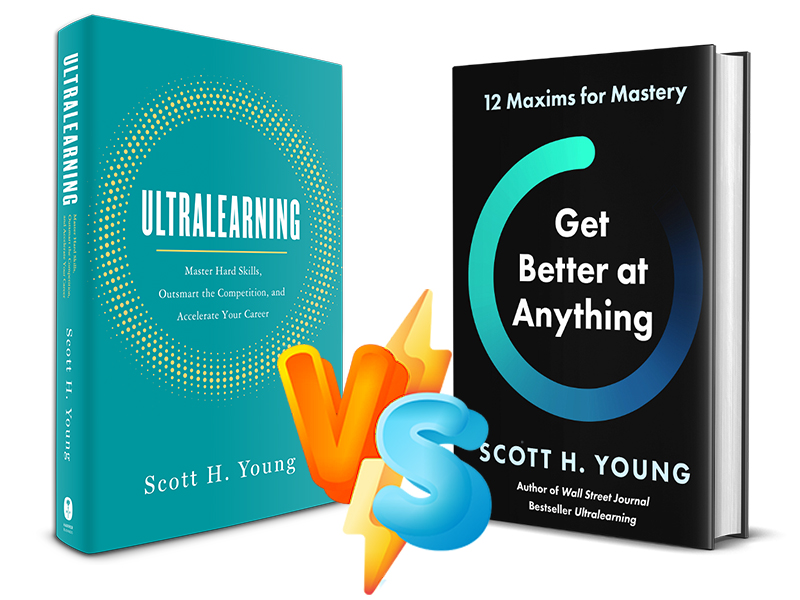Once I determined to put in writing one other e-book about studying, I knew an apparent query would come up: How is that this e-book totally different out of your final one?

The reality is, I might write a dozen books on studying. Even when engaged on this one, I noticed what number of areas I couldn’t discover sufficiently: psychological fashions, connectionism, background information, declarative versus procedural studying, motor studying, nootropics, intelligence, explore-exploit tradeoffs, growing old and extra. Every matter might be its personal e-book!
I took care to not repeat an excessive amount of from my earlier e-book when scripting this one. Some repetition is unavoidable, as I didn’t need to make studying Ultralearning a prerequisite for Get Higher at Something, however I wished the principle ideas, tales and sensible takeaways to be recent.
At a excessive degree, each books make the same pitch: that can assist you get higher at tough expertise and topics, however they differ in vital methods. At present I assumed it could make sense to clarify how the books differ and what you possibly can count on from every.
What’s the Distinction?
The most important distinction between the books is the main target. Ultralearning is centered round intense, self-directed studying tasks. Whereas most of the rules of this e-book apply past that individual context, these spectacular tasks type the core of the e-book, and every part is organized round them.
Get Higher at Something, in distinction, facilities on the idea that the mix of studying from different folks, training for your self and getting suggestions are very important for enchancment throughout many various disciplines, domains and pedagogical methods.
The central figures of Ultralearning are spectacular people—polyglots who communicate dozens of languages; solo sport builders who do the artwork, music and coding all on their very own; chess prodigies and Scrabble savants.
For Get Higher at Something, I wished the strategy to studying itself to be central. So after I talk about the coaching of poker gamers, jazz musicians, science-fiction authors or Air Drive pilots, it’s to not level out a very gifted particular person, however to exhibit the fundamental components of studying by way of concrete examples.
Ultralearning was additionally a way more private e-book, as debut books are typically. I wished to consolidate a lot of what I realized about efficient studying methods from the massive public challenges that helped set up me as a author right into a single e-book.
In distinction, with Get Higher at Something, I challenged myself to put in writing a extra goal, research-driven e-book. Whereas it’s inconceivable to keep away from one’s personal opinion, even when speaking about science, I wished to put in writing a e-book that grappled with a wider vary of skilled opinions.
Has Your Recommendation Modified Between Books?
My core beliefs about studying haven’t modified a lot between the 2 books. The minor updates to my views since writing Ultralearning are mirrored in Get Higher at Something, specifically:
- The significance of clear examples vs. pure apply. Due to its give attention to self-directed studying, I emphasised problem-solving and apply in Ultralearning. Whereas I nonetheless imagine that apply is essential, I’ve come to suppose that the hassle required for studying by problem-solving could be extreme, significantly if good examples can be found.1
- The worth of foundational studying earlier than direct apply. Directness, the concept it’s best to apply the precise talent you need to get good at, was a core precept of Ultralearning. I nonetheless suppose this strategy is efficacious, however it’s now clearer to me that many complicated domains are simpler to study after a preparatory section spent studying their core parts and background information.
- The worth of early entry to academics and coaches. Once more, partly due to the emphasis on self-directed studying in Ultralearning, I didn’t emphasize the worth of fine coaches and academics. I’m now satisfied that entry to good instruction and corrective suggestions is crucial for environment friendly studying.
General, the modifications are extra a matter of emphasis fairly than a reversal of opinion. My recommendation on studying evolves, largely, as a result of I’m repeatedly attempting to enhance my very own understanding of it. Whereas it might sound extra handy to provide you with an thought and spend the remainder of my writing profession defending it, I’d favor my writing about studying to replicate my philosophy of it—which is able to shift as I repeatedly work to refine my pondering.
Which Guide Ought to You Learn?
Each!
All kidding apart, the 2 books are complementary—studying one isn’t an alternative to studying the opposite.
However should you solely have time for one e-book about studying, I’d advocate Get Higher at Something. It gives a broad vary of sensible recommendation for studying and enchancment, whereas drawing on a deeper base of concepts about studying grounded in cognitive science.
After all, time will inform whether or not readers agree with that evaluation! Maybe if this e-book comes near the success I’ve had with Ultralearning, I’ll be capable of write a 3rd e-book about studying, masking just a few extra of the handfuls of essential concepts I wasn’t capable of match into my first two.

